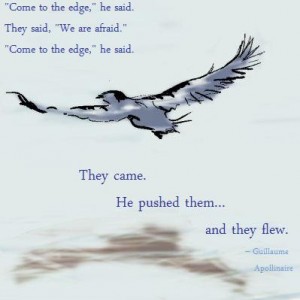Think of your favorite novels. What did you love most about them? Sure, they offered a fun and interesting story, but I’ll bet that, in many of those books, you were compelled most by the people you met on your journey—the characters.
We’re not just readers; we’re people. We relate to other people… even if they’re fictional. The real trick to effective writing is to make us suspend our disbelief long enough to consider that maybe, just maybe, your characters are real people too.
To Kill a Mockingbird, by Harper Lee – If you love this book as much as I do, then you also love Atticus Finch and Scout. You see what they see. You feel what they feel. Personally, I imagined myself seated in a rocker on Atticus’s front porch, as we spoke of the law, of politics, of our mutual hope that Scout would know a better world someday. Perhaps because I knew so little of my own father, I imagined what life might be like if Atticus were my dad. Such is the power of great characterization.
The Grapes of Wrath, by John Steinbeck – I can still feel the dust of Oklahoma layered over me. I can still smell my traveling mates, the Joad family and Casy, as it had been several days since we last had the opportunity to take a decent bath. I can still taste the mush, made only slightly better by the one spoon of sugar Ma allowed each of us. I can’t see Tom in that coal-black cave of vines, but I can hear him breathing. “I swar, I even spoke Okey fer awhile, like they done.” I loved the Joad family—Ma, Tom, Rose of Sharon, and the whole gang. I starved with them. I cried with them. I hoped against all odds with them. Such is the power of great characterization.
The Stand, by Stephen King – This story offers a character-rich environment—easily a dozen characters to whom you can open your heart. How could you possibly not like Nick, Stu, Glen, Frances, and of course, Mother Abigail. You can even sink your teeth into a number of bad guys. It’s an imaginative story, to be sure, but the characters kept me going for all 1,153 pages (complete & uncut edition). I feared with them. I cared with them. I sacrificed with them. Such is the power of great characterization.
A Soldier of the Great War, by Mark Helprin – As I read the story, I truly learned to love Alessandro Giuliani, the protagonist. If I could have chosen my own grandfather, I might have chosen Alessandro. I so missed him ten years after first reading the book that I had to read it again. It didn’t matter that I knew the story; I needed to visit the old man I loved. Eight years later, I visited him for a third time. Soon, we’ll be meeting again. Such is the power of great characterization.
A Prayer for Owen Meany, by John Irving – How effectively did John Irving bring Owen Meany to life? Despite the fact that the story itself often antagonized me, the reader, by virtue of politics with which I often disagreed, I still couldn’t put the book down. Owen Meany is one of the most compelling and unique people I’ve ever met. Yes, I met him, and he was just as amazing as I imagined he would be. Such is the power of great characterization.
These are only a few examples, varied in genres and styles, of novels that succeeded wildly not just because the authors told good stories, but because they brought to life great characters. They gave to us people who breathed, walked and talked on the page. They came to life and, in doing so, became a part of our lives.
What makes for great characterization? I can tell you what it’s not: he has blue eyes; she has red hair; she’s short with tiny feet and freckles; he has an aristocratic nose and wavy blonde hair. Are those details bad? Not necessarily. Are those details good? Not necessarily.
As a reader, I don’t like a lot of physical description. I always develop, when the author allows me to, my own mental image of the characters. I knew what Jack Ryan, from Tom Clancy’s novels, looked like long before Alec Baldwin or Harrison Ford played the character in movies. I knew what Nick, from Stephen King’s The Stand, looked like long before they released the TV movie. Rob Lowe as Nick? Sorry, but I don’t think so. Have you ever had that same reaction to an actor? Have you ever said, “No, no, no; he doesn’t look anything like that character?”
I liked Gregory Peck as Atticus Finch. I did not like Matt Damon as Jason Bourne. I liked Robert Urich as Spenser. I did not like Stacy Keach as Mike Hammer. I liked Tom Hanks as Forrest Gump.
You may feel different about each of those actors and characters, and that’s my point. For you, that female lead may be a short redhead with green eyes, a bit chubby, with freckles and an unfortunate birthmark. For me, she may be a long-legged blonde with blue eyes, a disarming smile, and a figure that takes my breath away. (Yeesh, I’m such a guy.) The freedom to exercise our imaginations draws us into a story, drives us to know your characters better.
Dear Author, please give us, your loyal readers, a little freedom.
What do readers really want in a character? We want to see her with our own eyes, hear her with our own ears, feel what she feels. We don’t want you to tell us that she’s afraid; we want you to show us the hair standing up on the back of her neck. We want to see her shiver, and see the goosebumps rise on her arms. We want to hear and feel her anguish over a lost love. We want to know her heart, her soul, her attitudes and desires—as if she were a good friend.
Such is the power of great characterization.
‘Til next time, and as always, remember: To write well, you must work hard. To succeed in this tough gig, you mustn’t be lazy (or discouraged).
———-










Please follow me here: